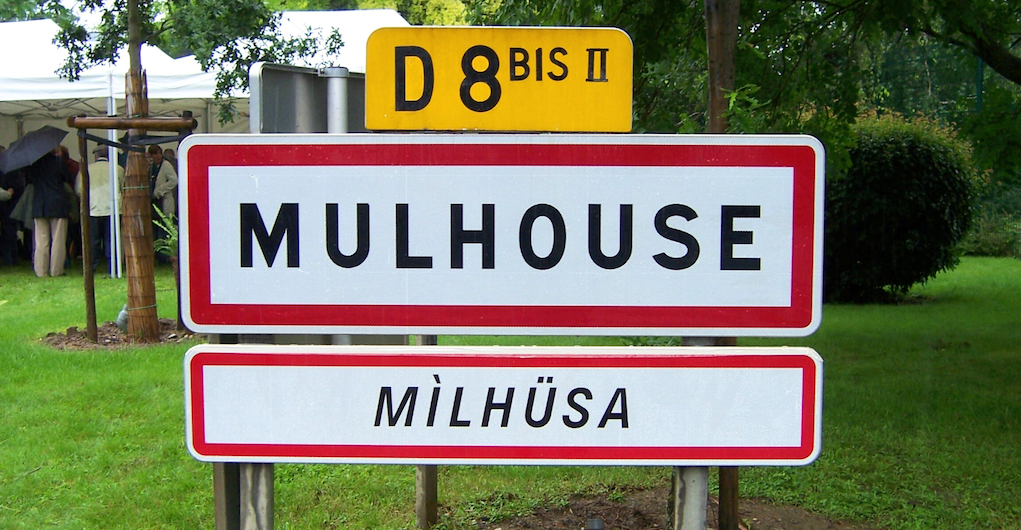
Interview: Julien Steinhauser on Language, Identity and Economic Opportunities in Alsace
24.06.2025Julien Steinhauser is a journalist at the regional newspaper Dernières Nouvelles d’Alsace and editor-in-chief of the bilingual magazine Rheinblick, which covers cross-border topics in the Franco-German area on a weekly basis. Together with his team, he reports on economic, cultural and political developments along the border – a subject of great interest in Alsace. In this interview, Steinhauser, who will also speak at the upcoming 9th Forum of European Minority Regions (27–28 June 2025 in Novi Sad/Újvidék, Serbia), talks about language and identity in Alsace, the economic advantage of bilingualism and the importance of regional cooperation.

Mr Steinhauser, as a journalist, how do you experience the dynamics of border regions like Alsace and Baden-Württemberg in terms of language, identity and economic value?
Alsace has always been a prosperous region, the second richest in France, largely due to its economy, which is partly influenced by that of Baden-Württemberg and also Switzerland. The Alsatian identity, essentially shaped by the Rhine region, suffered for a long time from the aftermath of the Second World War. However, the economic benefit, also driven by bilingualism, has helped to overcome this difficulty.
What role do regional identities and language skills – such as Alsatian or German – play in cross-border cooperation on the labour market?
Language skills are a major asset for cross-border commuters, especially in southern Alsace. More than 45,000 people commute daily to work in Basel and the surrounding area. While German and English are essential for qualified jobs, speaking the Alsatian dialect, a Germanic vernacularm, is often sufficient for simpler work. In recent years, several studies by French employment agencies have shown that a decline in the command of Alsatian goes hand in hand with rising unemployment. The reason: many people lack the language skills to communicate across the border – for example in German-speaking Switzerland. Without sufficient knowledge of standard German or the Alsatian dialect, access to cross-border employment is significantly hampered.
In your work, you surely encounter many stories from everyday life. Can you share examples where cultural or linguistic proximity has clearly facilitated economic cooperation?
A concrete example: in January 2025, the mayors of the three major cities Mulhouse, Basel and Freiburg im Breisgau met to discuss the organisation of the Eurovision Song Contest. Basel was unable to accommodate the entire audience. As both cities are less than 30 minutes apart by train, the hotels in Mulhouse were able to host part of the event’s visitors.

In your opinion, how visible is the contribution of minorities in public debates on economic development, investment or regional policy?
Alsace may not even fully realise that it constitutes a cultural and/or linguistic minority. The Alsatian economy is closely intertwined with that of Switzerland and Germany. The German chambers of commerce are regularly consulted for advice, and several cross-border job fairs are held throughout the year.
What needs to change so that the potential of linguistically and culturally diverse border regions can be better utilised – politically and economically?
The top priority in Alsace is to promote German language instruction. Only three percent of children still speak the regional language. If the language is not preserved, it will no longer be possible to maintain a high level of cross-border employment, and Alsace will face economic decline.
Пресс релизы
- FUEN wishes you a peaceful Christmas season, restful days and a bright, hopeful start to the new year!
- FUEN calls on the EU to act over systematic ethnic-based land confiscations in Slovakia
- Women of Minorities conference in Budapest calls for structural change to ensure equal political participation of minority women
- FUEN President Olivia Schubert at UN Forum on Minority Issues in Geneva
- "Laboratory of Peace": 28th Seminar of Slavic Minorities held in European Capital of Culture Gorica/Gorizia
- Equality in Political Participation and Representation: Third “Women of Minorities” Conference to Be Held in Budapest
- FUEN Working Group on Education discusses challenges and future of minority schooling in Europe
- 28th Seminar of Slavic Minorities in Europe to take place in Gorica/Gorizia, Italy
- Olivia Schubert in her first interview as FUEN President
- FUEN Assembly of Delegates elects new leadership – Olivia Schubert becomes new President














